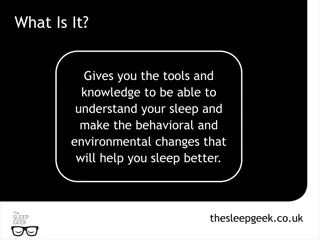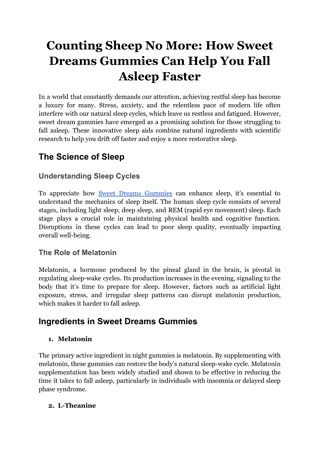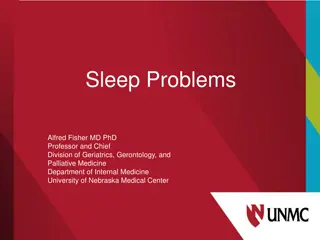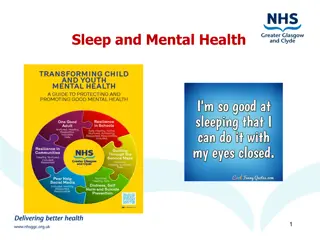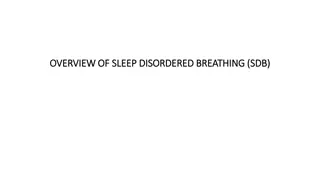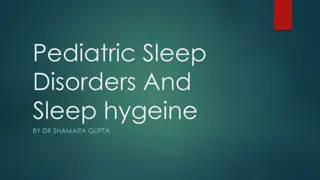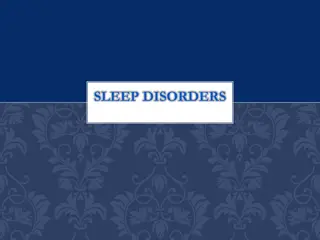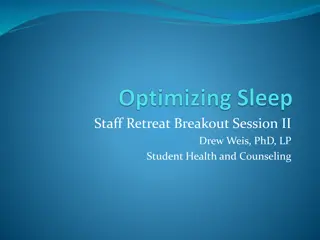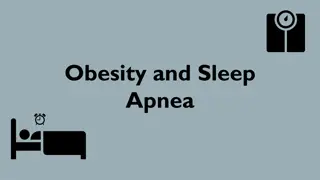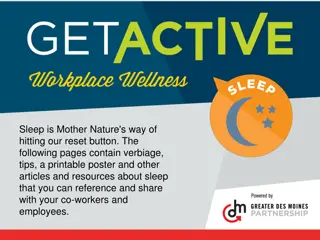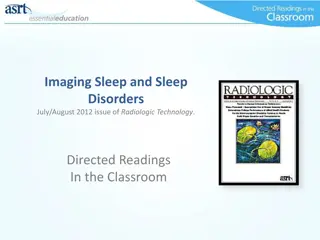Importance of Sleep in Recovery and Wellbeing
Sleep is crucial for overall health and wellbeing, playing a significant role in physical and mental recovery. Understanding individual factors affecting sleep patterns and maintaining good sleep hygiene can enhance quality of life. Identifying sleep patterns, addressing poor sleep quality, and practicing good sleep hygiene are essential steps towards ensuring restful and rejuvenating sleep.
Download Presentation

Please find below an Image/Link to download the presentation.
The content on the website is provided AS IS for your information and personal use only. It may not be sold, licensed, or shared on other websites without obtaining consent from the author.If you encounter any issues during the download, it is possible that the publisher has removed the file from their server.
You are allowed to download the files provided on this website for personal or commercial use, subject to the condition that they are used lawfully. All files are the property of their respective owners.
The content on the website is provided AS IS for your information and personal use only. It may not be sold, licensed, or shared on other websites without obtaining consent from the author.
E N D
Presentation Transcript
Sleep in a recovery context Sleep is central to wellbeing. It is as important to your health as healthy eating and exercise. Sleep also plays an important role regenerating glucose in the prefrontal cortex, the area of the brain that is associated with willpower. Like insufficient sleep, oversleeping is a sign of disordered sleep. It may be connected to a mental health issue such as depression. Understanding more about sleep s role, prioritising time for it and using strategies to maximise the chance of a good night s rest can improve the quality of your life.
Sleep - quotes The best bridge between despair and hope is a good night s sleep. A good laugh and a long sleep are the two best cures for anything. Sleep is the best meditation. Sleep is an investment in the energy you need to be effective tomorrow. The minute anyone s getting anxious I say, You must eat and you must sleep. They re the two vital elements for a healthy life. Though sleep, you disconnect from the word so you can reconnect with your soul. If you get tired learn to rest, not to quit.
Sleep - individual factors Your individual genetics your genes influence your circadian rhythms and internal sleep drive. Your age. Your activity level sleep is a time for the body to recover from exertion. The more active you are the more sleep you may need. Your health When coping with health issues, you may need additional rest. Life circumstances stress and periods of change can increase your need for sleep and by the same token make it difficult to sleep.
Identify your sleep pattern One of the first steps in overcoming sleeping difficulties is finding out any possible causes and trying to look for solutions. Pattern What is the pattern of your sleep on a typical night? How long does it take for you to fall asleep? How often do you wake up? How much sleep do you get? How many nights each week are like this? Is it refreshing? Is it enjoyable? Is it restless? How would you describe it in your own words? How has your sleep changed over time? Did you used to be a good sleeper? Quality How do you feel about the quality of your sleep? History Do you remember how and when your poor sleep started?
Sleep Hygiene Sleep factors to improve your sleep pattern: Limit alcohol Limit nicotine Manage diet Good sleep hygiene Limit caffeine Manage exercise Limit noise Limit light Manage room temperature Improve air quality
Sleep Hygiene Things that improve sleep Regular exercise How many times a week? What time of day? Relaxation exercises Turning off electronic devices at least 30 minutes before bed Having a relaxing bedtime routine Bath or shower Read a book Setting aside worry time each day to write down any issues that are bothering or concerning you Setting the conditions for sleep Bedroom is completely dark Mattress and pillows are comfortable Bedroom is the right temperature Wear comfortable clothes Things that make sleep worse Taking long naps during the day Watching television in bed Studying in bed Using a device with a bright screen in the hour before bedtime Consuming drinks with caffeine How many each day? __________ What time of the day was your last caffeinated drink? _________ Drinking alcohol/using substances Eating a heavy meal less than three hours before bedtime Watching the clock while trying to fall asleep Staying in bed even if you can t fall asleep
The Sleep Process Sleep is controlled by two interconnected systems: Circadian rhythm (or body clock) Homeostatic drive (or pressure to sleep) These two systems work together, taking their cues from day (light) and night (dark), and how long you have been awake, to: Regulate body temperature in preparation for sleep Release sleep hormones Increase the body s pressure to sleep
Sleep Centre vs Alertness Centre For the sleep centre to dominate over the alertness centre we need: To be tired To be calm and relaxed Our brain should not be active A quiet environment A dark environment To be at the right temperature To be comfortable External stimuli (such as noise), thinking, worrying etc. will all activate the alertness centre in our brain and prevent us from sleeping.
Sleep Centre Sleep comes naturally and effortlessly when we mentally and physically switch off. So trying to get to sleep is best approached as a passive process, rather like relaxation. You cannot force or make yourself go to sleep any more than you can force or make yourself relax. When you re-develop the habit of passively allowing sleep to occur, or not to occur, sleep is likely to occur more easily, because you are not mentally or physically striving. Many of us get the physical-mental balance wrong. We engage in too much mental activity and too little physical exercise and relaxation. When we readdress this balance, the body becomes naturally tired and more ready for sleep. Think about your daily schedule and the different activities that you do. Is there a balance between focus, concentrated activity and being able to switch off and relax? You may need to take some time to learn the art of winding down, letting go and switching off.
Sleep tips Get up at the same time each morning. Go to bed when you are feeling tired. Don t have long naps in the daytime or evening. After a bad night, do have a power nap (5-10 minutes) once or twice a day or a short nap for up to half an hour as these improve cognitive function and can help you get through the day. Create a relaxing routine and wind down before going to bed. Don t do anything that is mentally demanding within 60 minutes of going to bed.
Sleep and worry Think on paper. Write down your worries.
Bedtime wind-down routine If you have a hard time falling asleep, a regular bedtime ritual will help you wind down and prepare for sleep. It is important to associate the bedroom with calm, relaxation and sleep. It teaches the body when it s time to go to sleep.





